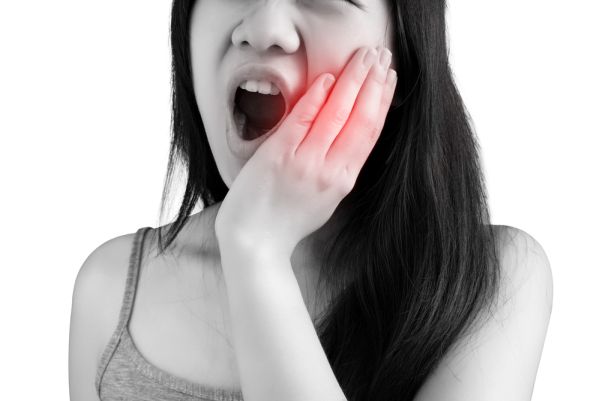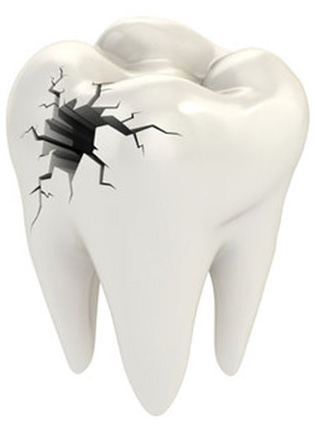Your molar’s main job is to grind down the food in your mouth to make it easier to digest. Your molars take tend to absorb the most force on a consistent basis, and they get to break down the toughest food. Over time, enough wear and tear, poor lifestyle choices.
Cracked Molar Symptoms
Generally, if a tooth cracks it’s painful, however, since molars are bigger teeth, you may not feel any pain initially after the crack, here are a few symptoms you may notice:
- Small gritty pieces of the tooth (might feel like chewing on sand).
- Sensitivity to hot and cold beverages.
- A sharp, jagged edge on your tooth.
- Pain that comes and goes.
- Local gum swelling around that tooth.

Causes Of Cracked Teeth
Cracked teeth can be a result of numerous issues, these often include, chewing hard foods, physical activity, teeth grinding (bruxism), and extensive dental work (which can make a tooth weak over time).
How To Prevent Broken Molars
The best way to prevent a molar from breaking is to take care of all your teeth! The best way to prevent teeth is to do the following best practices:
- Have outstanding oral care – Brush for up to 2 minutes, floss every tooth, use mouthwash.
- Get enough fluoride – Fluoride strengthens and fortifies the enamel which will prevent decay, and breaking.
- Stay away from certain foods – Foods like hard candies, nuts, and more can increase the chance of teeth breaking.
- Consistent dental checkups – Your dentist will be able to tell you if you are taking optimal care of your teeth.

Broken Molar After Care
If you broke your molar, you might not be able to get it fixed immediately, if this is the case, you need to be extra cautious, and it needs to be taken care of. So what can you do to make sure the problem doesn’t go from bad, to significantly worse? Here are a few tips you can use!
- Warm water salt rinse – Salt is antimicrobial which will kill germs, and help protect the tooth. Mix a teaspoon of salt with a glass of warm water, then gently swish it around your mouth.
- Cold compress – Use a bag of frozen vegetables, or ice in a Ziploc bag, and lightly press it up against the side of your face that has the broken molar. Do this for 10 minutes at a time, or whatever feels comfortable.
- Over-the-counter medication (OTC) – Drugs like Advil, Tylenol, and Ibuprofen, can help mitigate the pain.
- Chew with the other side – Use your other molars so you don’t continue to damage the tooth.
- Eat softer foods – Try to stick to foods like yogurt and smoothies until you get it fixed

Broken Molar Treatments
Bonding
The dentist will take fillings and bond them onto your teeth to fill in the break. Their are multiple fillings available that include, different metals, resins, and sizes.
Tooth Crowns
A tooth crown is the area of the tooth that is above the gum line. A tooth crown can be replaced by artificial crowns which are made in a dental lab. This will ensure the tooth is stable for future use.
Tooth Extraction
If the tooth is very badly broken, there may not be enough tooth left for a suitable repair. If this is the case, then the remaining parts of the tooth will be extracted. Afterward, you can get a dental implant, bridge, dentures, or partial dentures, depending on your specific situation.
